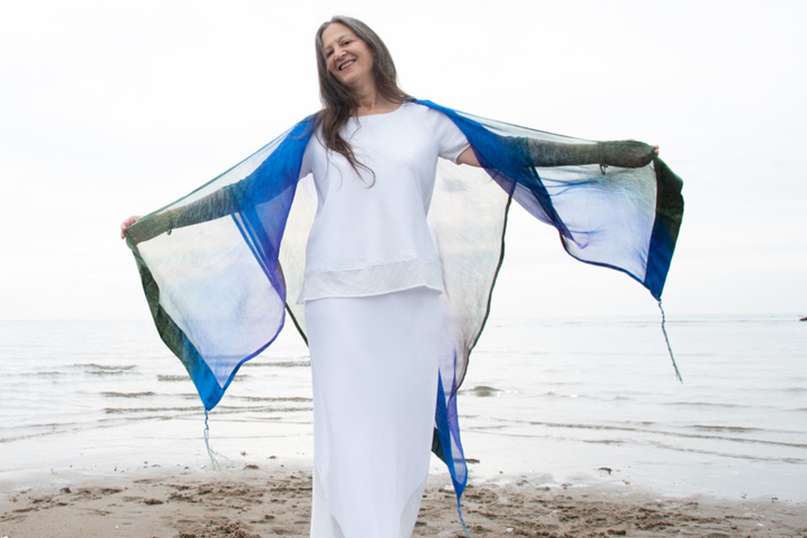
By Stacey Dresner
NORWALK – The past year has been a momentous one for Batya Diamond.
Last year, the songwriter, teacher and spiritual leader from Norwalk recorded her new full-length album “Infinite Wisdom: Chants of the Divine Feminine,” a collection of 14 chants performed in both Hebrew and English, which was released on Jan. 10 – which also happened to be her 60th birthday.
Last August, Diamond became a Hebrew Priestess, receiving her ordination from Kohenet Hebrew Priestess Institute, which, according to the institute’s website, is “a training program in spiritual leadership for women on a Jewish path.” As well as a movement, a sisterhood, and a network of communities” that “seeks to revive and re-embody Judaism through the gifts of women spiritual leaders.”
When Diamond learned about Kohenet, which trains its priestesses at the Isabella Freedman Retreat Center in Falls Village, she says, “it was like all of the tumblers fell into place.
“I’ve always been spiritually connected but more so once I had my children, which was in the mid to late ‘90s,” she says. “Having children brought me to another level of spiritual connectedness and that was when I went to rabbinical school [at the Academy for Jewish Religion]. I didn’t finish because I didn’t feel like I fit in the traditional structure where rabbis operated.”
Diamond recalls the early years of her Conservative Jewish education in Brooklyn fondly. But one incident sparked the beginning of her feminist sensibilities.
“I was 12 and I was not allowed to read from the Torah for my bat mitzvah, even though I was a Hebrew day school student. It was around 1972 and the feminist wave was happening then and so I think that was always sort of an old wound that took years to correct,” she says. “I loved synagogue; I loved the prayers; I loved the Torah…it was very painful. So, I think that sort of pushed me away from formalized traditional religion.”
She graduated from Smith College in Northampton, Mass., and after college, spent several years living in Manhattan, where she attended New York Law School, before moving to Norwalk 30 years ago. Over the years, she has worked as a lawyer, private investigator, radio traffic reporter, and stay-at-home mom.
After she left her studies at the Academy for Jewish Religion, she began to privately tutor bar and bat mitzvah students.
“People found me by word of mouth and I would tutor the students and officiate at their b’nai mitzvahs. I’ve been doing that since 1998.”
Diamond first read about Kohenet in 2016.
“When I discovered that there was this group that was in existence that was feminist and earth-based, it sort of recalled the ancient practices of women from Biblical days – like, what were the roles of the priestesses, and the prophets and the healers and the dreamers back in ancient times? The stories that didn’t get told in our canon,” she says.
Kohenet was co-founded by Rabbi Jill Hammer, who also teaches at the Institute.
“She’s done so much writing and has done so much exploration of new liturgy and poetry… it’s just a softening of a way to access Judaism,” Diamond says.
In her role as Kohenet, Diamond, a founder of Wilton Jewish Center co-leads an annual Women’s Seder and High Holiday services at the Wilton Library. She also leads Rosh Chodesh and healing circles and teaches Kabbalah at her homes in Norwalk and on Martha’s Vineyard.
“We do Rosh Chodesh Elul before the High Holidays and do a mikveh at a pond,” she says. “Honoring the elements – earth, water, air and fire – is another big practice in all of the rituals I do.”
And all along, she has been playing and writing music.
Diamond has produced several albums of her own music, but “Infinite Wisdom” is different – “deliciously so,” she says. The album was produced by Redding-based musician, David Morgan, who has also worked with Neshama Carlebach.
“I wrote the chants but he added the production with all of the instruments and the lushness and the pacing of it all.”
Diamond doesn’t refer to the chanting on her CD as “Kirtan,” which some Jewish artists have adopted from the traditional Hindu call-and-response chanting, replacing the Hindu with Hebrew.
“Actually, I call it more of a ‘Shaviti’ chant; more of a short-hand for a Jewish meditative, contemplative device,” she explains. “This is an album of 14 either feminist, meaning in Hebrew feminine language as opposed to masculine, or gender-neutral. And most of the chants are to Shechinah – which is one of the names for the feminine divine.
“I trace so much of what I do now back to my first encounter with [the late] Debbie Friedman and her ‘Mi Shebeirach,’” she adds. “When I first heard that song it gave me so much permission to take these traditional words and add English and make it sort of simple and accessible for people. So, this album for me is a culmination of accessibility and simplicity, especially now when a lot of people want to discover their authentic connection to Judaism. They might not have had one before or they might have had a horrible experience at Hebrew school – I hear that from a lot of my clients.”
The 14 chants on the CD were each created with intentions, she points out.
“So, if you are looking for something in particular, for healing or for grounding or for power or for honoring the moment, there are different categories of things that might resonate with you… One of the chants is ‘Shechinah Shine On’ and you just repeat it over and over. It’s inviting in the light of Shechinah. You chant the words over and over and I give a kavenah – an intention – or a hashtag – like, #healing,” she laughs.
Another chant is entitled “B’rucha At.”
“That sort of encapsulates my philosophy, if you will, or at least my approach on this album which is that instead of saying, ‘Baruch Ata’ we are saying ‘B’rucha At,’ which is the feminine,” Diamond explains. “So, this is actually a feminized ‘Shehecheyanu,’ thanking Shechinah for letting us live to see this day. This is an upbeat dance party kind of song. It’s enthusiastic; it’s tikkun. Tikkun is the word that comes up for me a lot – just repairing, or trying to bring balance, that’s what it’s all about…trying to bring balance.”
Main Photo: Hebrew Priestess Batya Diamond. Photo credit: Pamela Einarsen Photography








 Southern New England Jewish Ledger
Southern New England Jewish Ledger








